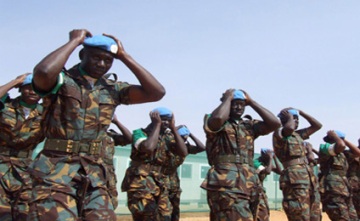JEM releases Darfur peacekeepers, calls for Gambari’s resignation
February 20, 2012 (KHARTOUM) – The rebel Justice and Equality Movement (JEM) on Monday said it released 49 peacekeepers of the African Union-United Nations Mission in Darfur (UNAMID) after they were held for entering the group’s territories without permission.

News of UNAMID’s peacekeepers being held by JEM unfolded on Monday, but according to Bilal, their patrol was stopped on Sunday afternoon and JEM later moved the peacekeepers to Shaqiq Kar area, 300km northwest of El Fashir, the capital of North Darfur State.
Bilal explained that his group had decided to let the go peacekeepers after it was concluded through investigations that the commander of the patrol did not know they had entered a JEM-controlled area.
The rebel official pointed out that his group had decided to keep three Sudanese who were with the peacekeepers after they gave conflicting statements during interrogation, which led JEM to suspect they might be government security agents.
UNAMID on the other hand has strongly condemned JEM for the situation, and stressed that its Sudanese staff are not working for anyone else. The mission’s spokeswomen Susan Manuel told Sudan Tribune that UNAMID is “outraged” at the action of JEM.
She revealed that UNAMID had been in negotiations with JEM to secure the release of the local civilian staff, explaining that the mission expects JEM to release them immediately and without conditions.
Manuel emphatically stated that the Sudanese staf are UNAMID staffers and not members of the National Intelligence and Security Services (NISS).
“We are outraged at their detention and we want JEM to free them immediately and without harm or conditions” she declared.
JEM’s spokesman indicated that investigations with the three Sudanese would continue and they would be released if their innocence is proven. Bilal said the fact that the Sudanese interpreters work for UNAMID does not necessarily mean that they are not also working for the Sudanese intelligence service.
He attributed the arrest to the fact that the peacekeepers entered JEM territories without permission which could jeopardise their own security because the Sudanese army might strike them and accuse JEM of doing it.
Bilal also denied claims by the Sudanese Army that its forces were on the trail of JEM forces, saying that no Sudanese army forces were present in the area.
JEM’s spokesman claimed that his group had previously proposed an agreement to UNAMID to regulate the movement of its troops within JEM’s territories but the mission rejected the deal.
Ibrahim-Gambari
He went on to chide UNAMID’s joint special representative Ibrahim Gambari, reiterating that JEM demands that he is sacked.
“We call on the UN Secretary-General Ban Ki-Moon to sack Gambari because he has become a persona non-grata,” Bilal said.
Relations between JEM and UNAMID have not been particularly good. UNAMID and its chief Gambari support the Doha Document for Peace in Darfur (DDPD) signed last July between the Sudanese government and the Liberation and Justice Movement (LJM), while JEM rejects the deal.
On top of being UNAMID’s chief, Gamabri also took the position of the UN-AU Joint Special Representative for Darfur after the resignation of Djibril Bassole in July 2011.
JEM accuses Gambari of exceeding the mission’s mandate and lacking credibility to mediate.
“Gambari who offers great services to the Sudanese police is not eligible for this role,” JEM’s newly elected leader Gibril Ibrahim told a British diplomat this week.
UNAMID was established in 2007 under a UN Security Council resolution with a robust mandate to protect civilians, its own personnel but also to ensure the access of humanitarian workers to the needy civilians in the troubled region.
But the mission has been criticised for failing to defend itself against attacks on its personnel as well as being unable to overcome government restrictions on the movement of its peacekeepers.
The level of the conflict in Darfur has dipped in recent years but incidents of insecurity and kidnapping still occur. The UN says more than 300,000 people were killed and 2.7 million lost their homes after the conflict erupted in 2003 between the government and rebel groups accusing it of marginalising the region.
(ST)
